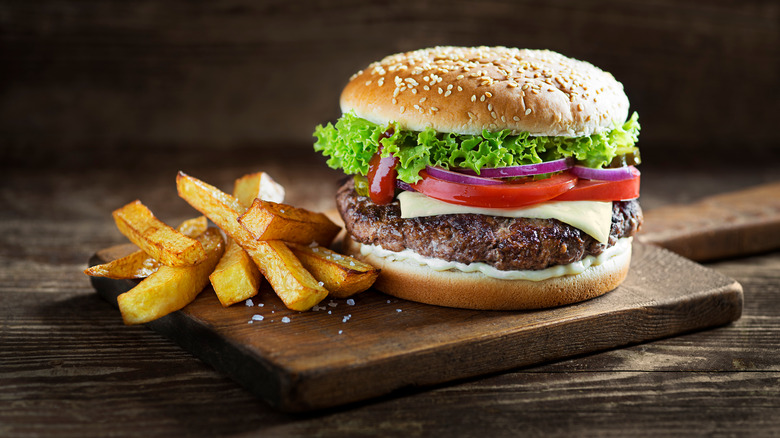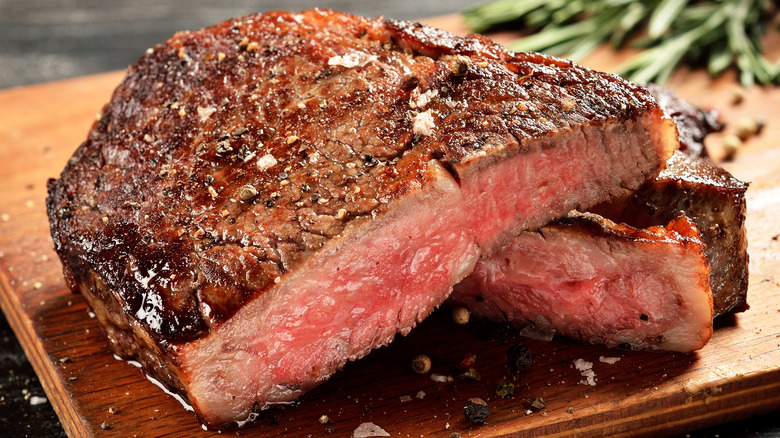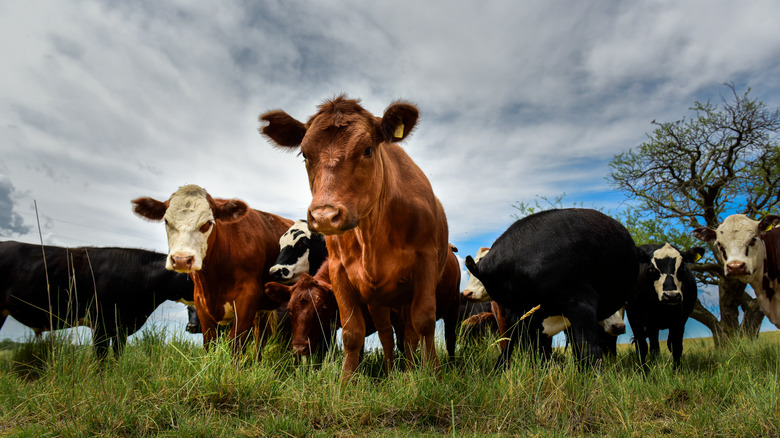You Should Never Order A Burger Medium-Rare At A Restaurant. Here's Why
For many burger enthusiasts, medium rare equates with juicy and flavorful, while well done is short for "dry hockey puck." That's why some people's taste buds may be inclined to rebel against the CDC, which recommends cooking ground beef all the way to well done — 160 degrees Fahrenheit on the inside — to prevent infection by E. coli or other nasty bacteria. Now you won't find it in the U.S. Bill of Rights, but freedom of choice is highly valued in society, so many restaurants allow you to order your burger anywhere along the "doneness" spectrum, from rare to well done.
But with choice comes responsibility. If you want to make sure to avoid bacteria that can make you sick (or even kill you), then you should not order that burger medium rare. An E. coli outbreak in 2014 sickened 12 people and prompted the recall of 900 tons of ground beef, according to the CDC. "Most of the ill persons in this outbreak reported eating undercooked ground beef at restaurants," the CDC said on its website.
Rare steaks aren't as dangerous as ground beef
Steak lovers don't need to worry so much about this. That's good, because a poll by FiveThirtyEight revealed that most people say they like their steaks medium rare. In a similar vein, Serious Eats polled people online about their temperature preferences for hamburgers rather than steaks. While 24% said they liked rare or medium rare, 46% said medium well or well. Sounds like the news about the dangers of ground beef is getting out there.
Ground beef is more dangerous than steak for a couple of reasons. From meat processor to table, ground beef is handled more than steaks are, and the grinder can mix bacteria into the center of a burger, which of course won't happen to a cut of beef that isn't ground (via USDA). Also, a single package of ground beef can come from multiple cows, which increases the risk of contamination (via Health). Between 2003 and 2012, according to Consumer Reports, more than a thousand people got sick in 80 separate cases of E. coli-contaminated beef — mostly ground beef. Those numbers are just the tip of the sirloin, so to speak, as about 96% of E. coli cases go unreported.
Sustainably raised cows produce healthier beef
Consumer Reports dug deeper, testing 300 packages of store-bought ground beef for E. coli and four other bacteria that can cause food poisoning. All of the meat was contaminated with fecal bacteria (insert sick-face emoji here). Thankfully, Consumer Reports didn't find in their samples the infamous E. coli strain that sickened people in 2014. They did find salmonella and clostridium perfringens, which is linked to about 1 million illnesses a year.
Can meat eaters reduce their risk of food poisoning while still enjoying their burger medium rare? The Consumer Reports study found fewer bacteria in beef from cows raised sustainably. A cow qualified as sustainable if it was organic, antibiotic-free, or grass-fed. If your ground beef comes from a single animal, that reduces the contamination risk, too. Consider all this just one reason why you should follow the sustainability mantra, "know your farmer" (via Lilly Den Farm).
While the health risk associated with bacteria in fresh ground beef turns out to be low for healthy adults, the elderly and pregnant women are at higher risk (via Today). For anyone who wants to be on the safe side of the food-thermometer spectrum, the lab team at Consumerist, an offshoot of Consumer Reports, came up with another handy review: ways to cook a beef patty to well done so that it is still palatable. Consumerist busted a popular burger myth. It turns out you can have your burger well done and have it juicy, too.


